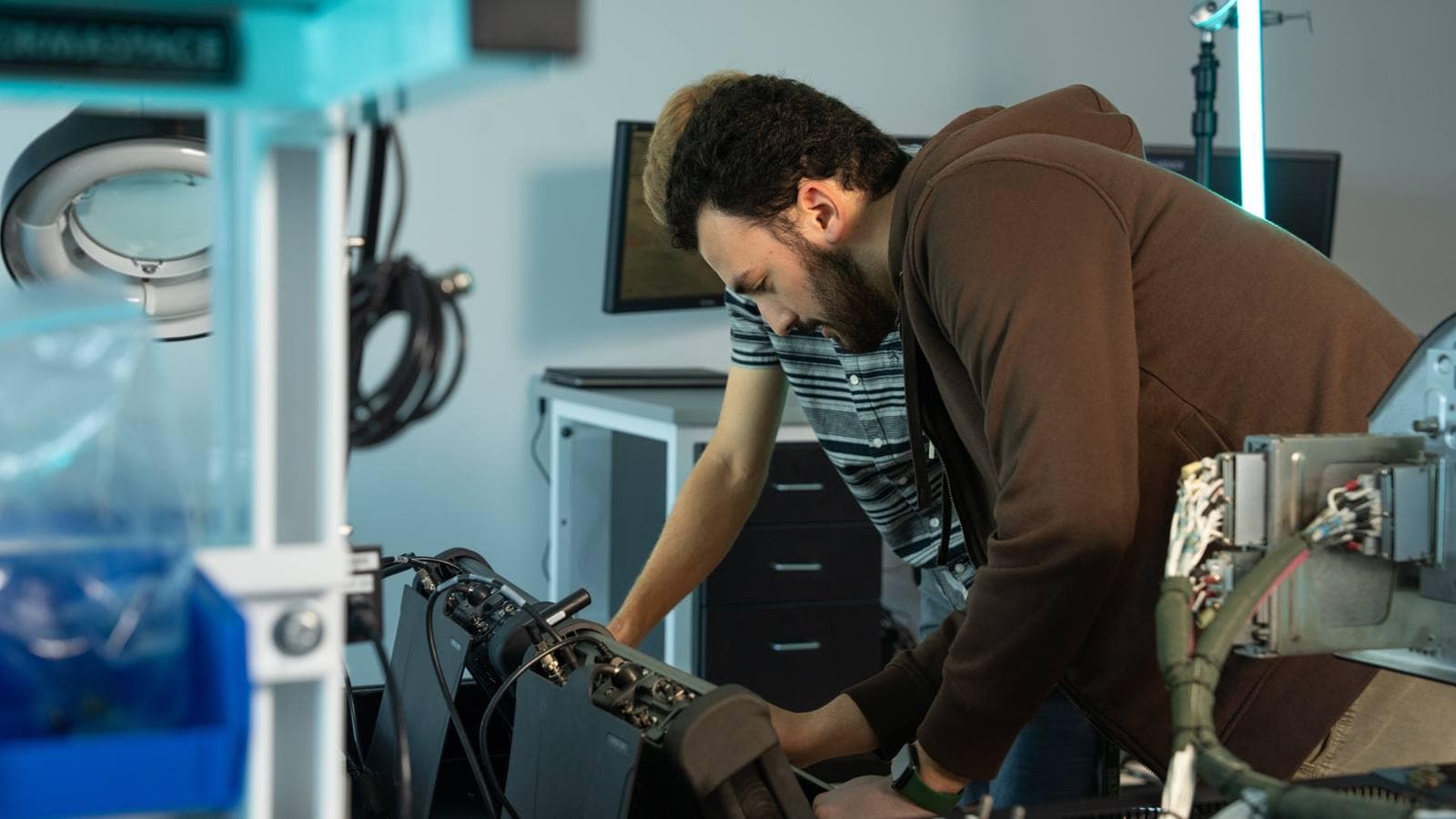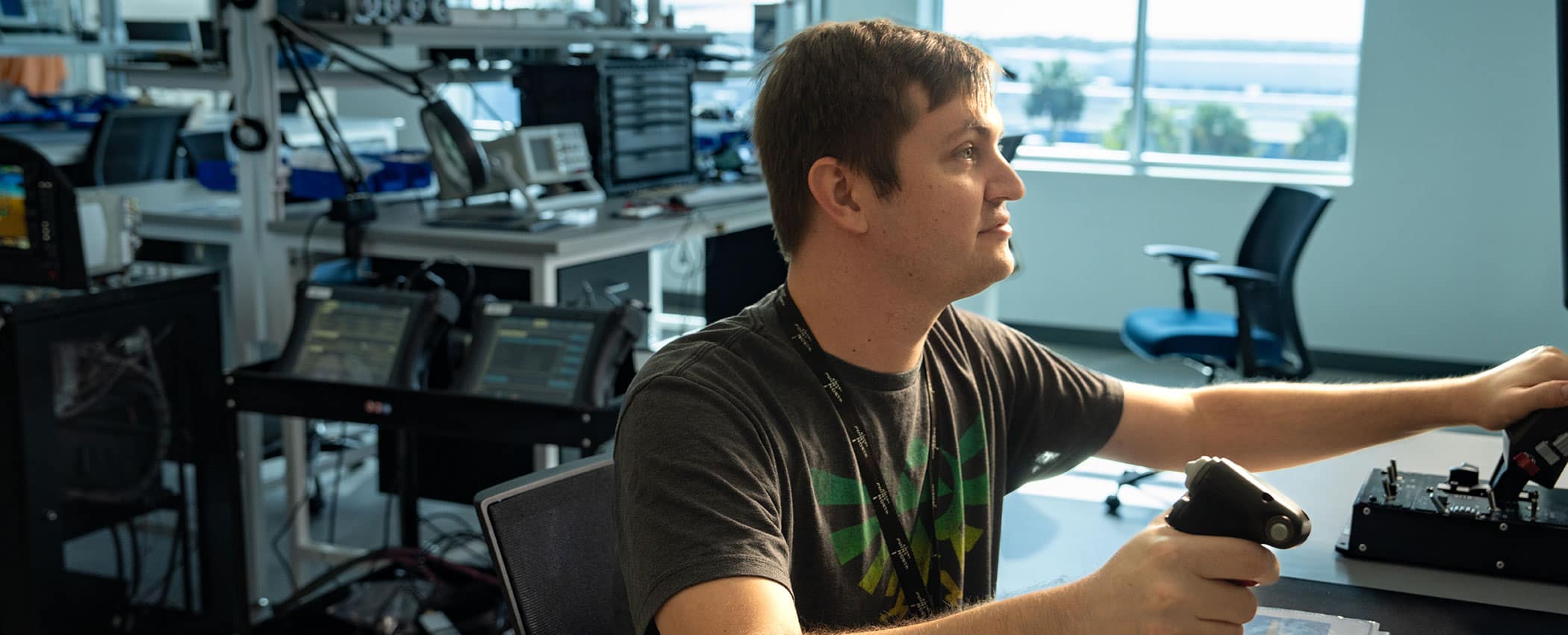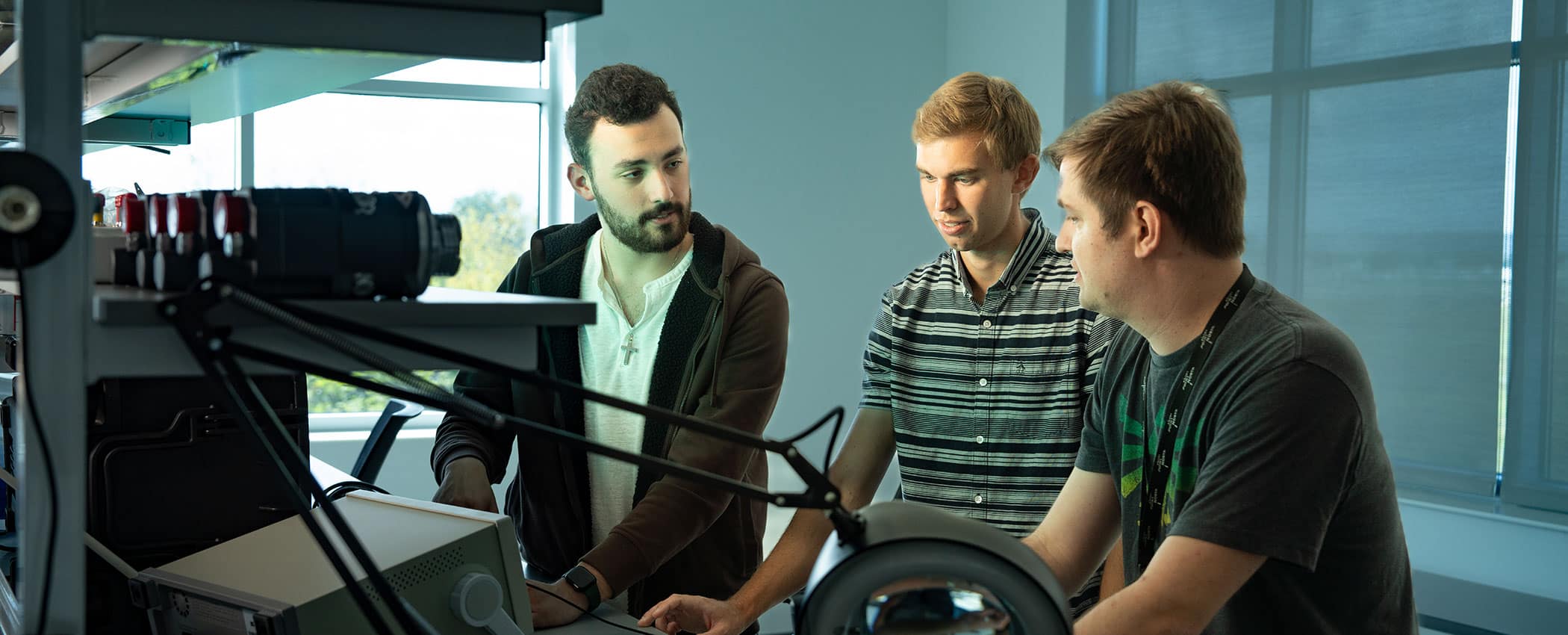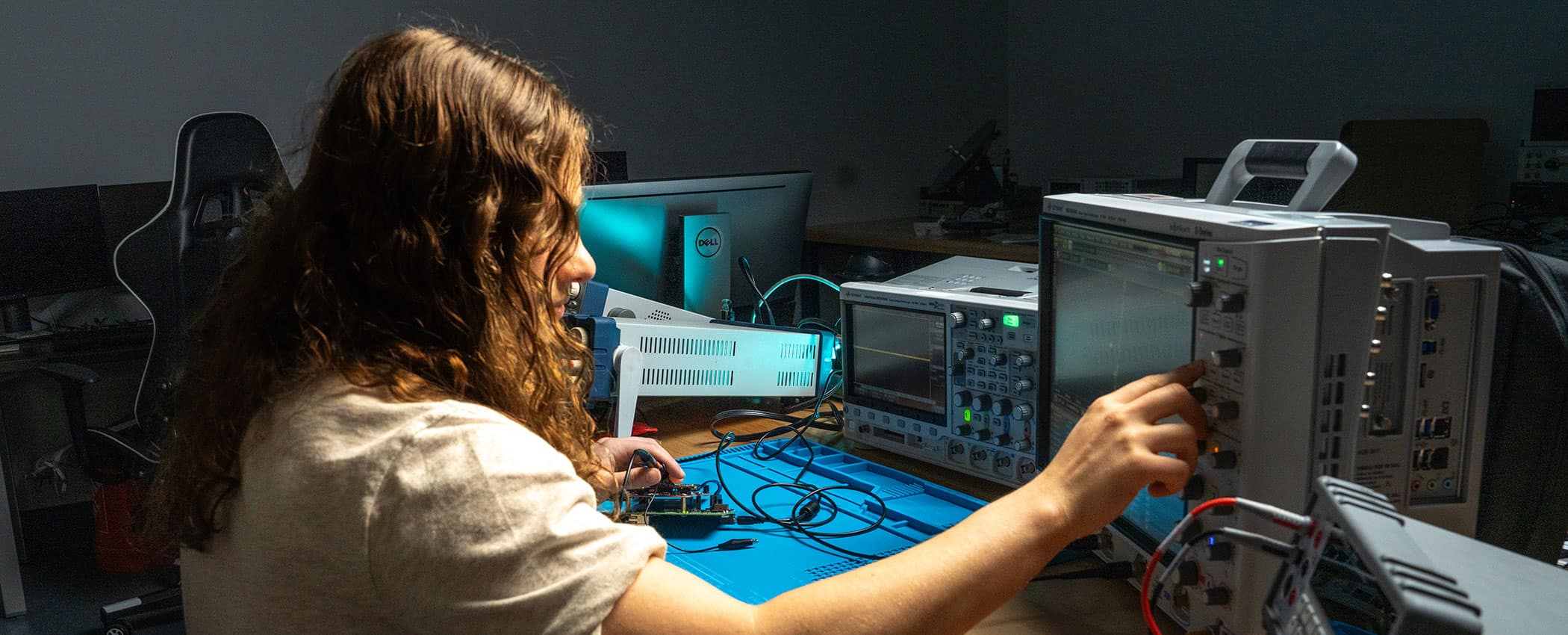
Master of Science in
Electrical & Computer Engineering
The Master of Science in Electrical & Computer Engineering allows students to gain technical proficiency and the ability to execute systems-level design.
About the Master of Science in Electrical & Computer Engineering
According to the U.S. Bureau of Labor Statistics, electrical engineers and computer engineers both continue to have above-average job growth and the industry is predicted to grow 5% from 2022 to 2032. An Electrical & Computer Engineering degree at Embry‑Riddle gives students the skills and knowledge necessary to work in engineering leadership roles for many industries.
Program faculty are experienced professionals who bring firsthand knowledge and conduct ongoing research in which students can participate. Applicants must have an undergraduate degree in electrical or computer engineering, another engineering discipline, computer science or the physical sciences.
Student Learning Outcomes
What you will learn while pursuing an Electrical & Computer Engineering degree:
- Apply fundamental electrical and computer engineering professional practices to analyze, design and implement electrical and/or computer systems.
- Apply knowledge of advanced topics in electrical or computer engineering as appropriate to their chosen concentration.
- Communicate effectively on issues pertaining to electrical and computer engineering.
Electrical & Computer Engineering Career Opportunities
Careers and Employers
Electrical & Computer Engineering master's graduates often secure positions such as circuit design engineers, system analysts, network and systems engineers and radio frequency engineers.
Electrical & Computer Engineering degree graduates enter the industry with companies such as:
- The Boeing Company
- FedEx
- General Motors
- Northrop Grumman
Electrical & Computer Engineering Salary Information
As of 2023, graduates with a degree in Electrical & Computer Engineering receive competitive salaries, with an average income of $101,000 annually.
DETAILS
About Electrical & Computer Engineering at the Daytona Beach, FL Campus
A degree in Electrical & Computer Engineering prepares students for advanced careers in industries where increasing reliance on systems-level design has created a high demand for electrical, computer, software and systems engineers
The Daytona Beach Campus is home to the Eagle Flight Research Center, Green Garage and the Radar and Microwaves Lab, where students can take advantage of research opportunities and explore integrated circuit design and analysis.
Electrical & Computer Engineering Information
- Credits: 30
- Mode of Study: In-Person
- Thesis: Thesis & Project (Non-Thesis Option)
Helpful Links
- Tour our Daytona Beach Campus
- Discover the Department's Faculty
- Explore the Fields of Study: Engineering & Computer & Technology
- Find Related Clubs & Organizations
Student Learning Outcomes
Students will:
- Apply fundamental electrical and computer engineering professional practices to analyze, design, and implement electrical and/or computer systems.
- Apply knowledge of advanced topics in electrical or computer engineering, as appropriate to their chosen concentration.
- Communicate effectively on issues pertaining to electrical and computer engineering.
MSECE (Thesis option)
| Core courses | 15 | |
| Electives | 6 | |
| CEC 700 | Graduate Thesis | 9 |
| or EE 700 | Graduate Thesis | |
| Total Credits | 30 | |
MSECE (Non-thesis option)
| Core courses | 15 | |
| Electives | 12 | |
| CEC 690 | Graduate Project | 3 |
| or EE 690 | Graduate Project | |
| Total Credits | 30 | |
Areas of Concentration
Electrical Engineering
This area includes avionics, communications, power electronics, electromagnetic systems, computing systems, control systems, and systems engineering.
| Core Courses for Electrical Engineering Concentration | ||
| EE 510 | Linear Systems | 3 |
| EE 515 | Random Signals | 3 |
| EE 525 | Avionics and Radio Navigation | 3 |
| EE 620 | Digital Communications | 3 |
| SYS 500 | Fundamentals of Systems Engineering | 3 |
| Electives for Electrical Engineering Concentration * | ||
| Thesis Option, choose two; Non-thesis Option, choose four of the following: | 6-12 | |
AE 514 | Introduction to the Finite Element Method | |
AE 526 | Engineering Optimization | |
AE 527 | Modern Control Systems | |
CEC 500 | Engineering Project Management | |
CEC 510 | Digital Signal Processing | |
CEC 526 | Sensor Data Fusion | |
CEC 530 | Image Processing and Machine Vision | |
CEC 610 | State and Parameter Estimation | |
EE 500 | Digital Control Systems | |
EE 505 | Advanced Mechatronics | |
EE 527 | Modern Control Systems | |
EE 528 | Sensors and Data Links | |
EE 529 | Electro-Optical Systems | |
EE 625 | Satellite-Based Communications and Navigation | |
EP 501 | Numerical Methods for Engineers and Scientists | |
EP 505 | Spacecraft Dynamics and Control | |
HFS 635 | Human-Computer Interaction | |
MA 510 | Fundamentals of Optimization | |
ME 503 | Introduction to Autonomous Vehicle Systems | |
ME 520 | Sensor Processing with Applications | |
ME 527 | Modern Control Systems | |
ME 613 | Advanced Model-Based Control Design | |
ME 615 | Pattern Recognition and Machine Learning | |
SE 500 | Software Engineering Discipline | |
SE 530 | Software Requirements Engineering | |
SE 610 | Software Systems Architecture and Design | |
SYS 505 | System Safety and Certification | |
SYS 530 | System Requirements Analysis and Modeling | |
SYS 560 | Introduction to Systems Engineering Management | |
SYS 610 | System Architecture Design and Modeling | |
SYS 625 | System Quality Assurance | |
SYS 660 | Organizational Systems Management | |
| Total Credits | 21-27 | |
- *
Other electives may be approved by the degree program coordinator
Computer Engineering
This area includes the analysis, design, development and deployment of computer systems, particularly real-time, safety-critical, and high-reliability systems.
| Core Courses for Computer Engineering Concentration | ||
| CEC 500 | Engineering Project Management | 3 |
| EE 510 | Linear Systems | 3 |
| EE 515 | Random Signals | 3 |
| SYS 500 | Fundamentals of Systems Engineering | 3 |
| SYS 505 | System Safety and Certification | 3 |
| Electives for Computer Engineering Concentration * | ||
| Thesis Option, choose two; Non-thesis Option, choose four of the following: | 6-12 | |
AE 514 | Introduction to the Finite Element Method | |
AE 526 | Engineering Optimization | |
AE 527 | Modern Control Systems | |
CEC 510 | Digital Signal Processing | |
CEC 526 | Sensor Data Fusion | |
CEC 530 | Image Processing and Machine Vision | |
CEC 610 | State and Parameter Estimation | |
EE 500 | Digital Control Systems | |
EE 505 | Advanced Mechatronics | |
EE 525 | Avionics and Radio Navigation | |
EE 527 | Modern Control Systems | |
EE 528 | Sensors and Data Links | |
EE 529 | Electro-Optical Systems | |
EE 620 | Digital Communications | |
EE 625 | Satellite-Based Communications and Navigation | |
EP 501 | Numerical Methods for Engineers and Scientists | |
EP 505 | Spacecraft Dynamics and Control | |
HFS 635 | Human-Computer Interaction | |
MA 510 | Fundamentals of Optimization | |
ME 503 | Introduction to Autonomous Vehicle Systems | |
ME 520 | Sensor Processing with Applications | |
ME 527 | Modern Control Systems | |
ME 613 | Advanced Model-Based Control Design | |
ME 615 | Pattern Recognition and Machine Learning | |
SE 500 | Software Engineering Discipline | |
SE 530 | Software Requirements Engineering | |
SE 610 | Software Systems Architecture and Design | |
SYS 530 | System Requirements Analysis and Modeling | |
SYS 560 | Introduction to Systems Engineering Management | |
SYS 610 | System Architecture Design and Modeling | |
SYS 625 | System Quality Assurance | |
SYS 660 | Organizational Systems Management | |
| Total Credits | 21-27 | |
- *
Other electives may be approved by the degree program coordinator.
Get Started Now:
Summary
30 Credits
Estimate your tuition by using the Tuition Calculator
View Financial Aid Information
Learn about our General Education
Find out about transferring credits to this degree
Learn more about our Veterans & Military benefits
View our Academic Calendar




